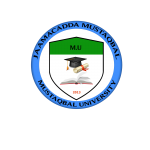Bachelor of Veterinary Science
The aims of this course is to prepare highly-qualified specialist veterinaries. The graduates of this program will have expertise in improving the livestock sector for a better provision of more health foods, providing foods that are safe and free from harmful residues and pollutants that are usually transmitted through animal products.
Learning competencies
By the end of the study programme of Bachelor’s Degree in Veterinary Medicine, graduate must be able to:
• Precisely apply knowledge and professional skills in veterinary medicine to maintain animal health and obtain maximal productivity in livestock.
• Keep abreast with recent advances in veterinary medicine.
• Evaluate occurring evidences sharply and accurately.
• Apply the concepts and methods in research and technology in veterinary medicine.
• Commit to continuing education, training and seeking for knowledge.
• Conduct oneself in a professional manner, appreciate the ethical and legal obligations of the veterinary profession and understand and apply the ethical codes within the field of veterinary medicine.
• Be able to communicate effectively with lay public, colleagues and responsible authorities, and clarify the important role of veterinary medicine for the individual and for society as a whole.
• Know the actual situation of the livestock sector in the nation, and recognize endemic and exotic diseases.
• Have a working knowledge of the control of zoophytic diseases and demonstrate the importance of the role of the veterinarian in safeguarding public health.
• Give soundly-based advice when presented with a problem related to veterinary medicine.
• Be aware of personal limitations and demonstrate awareness of when and from where to seek professional advice, assistance and support.
• Work effectively as a member of a multi-disciplinary team in the delivery of services to clients.
Program Duration
This is a four-year program. Every academic year consists of two 24-week semesters of theories and practical attachment as dictated by the course curriculum.
Admission Requirements
Admission criteria in health training programmes have far-reaching implications in education and training processes and the outcomes of such programmes, thus, the graduates and the quality of health services. Consideration of the admission requirements to the Community Health Nurse programme is in light of the prevailing health situation in Somalia.
Candidates for direct or in-service admission into the course programme must possess the stipulated qualification requirements in Somalia, and the equivalent, especially in neighboring countries.
Any student seeking admission from any MU Department of Nursing to pursue the course should fulfill the following requirements:
1. Be not younger than 18 years of age.
2. Submit secondary leaving certificate with minimum average marks of not less than 60% from recognized school and umbrella and passed the Somali Government centralized exam.
3. Application for admission.
4. Pay the registration and enrollment fees as per required.
5. Fill the application form fittingly.
6. Successfully pass the university entrance examination,
7. Bring the following documents with you:-
a. Original secondary certificate (both from the school & the government)
b. Original national identity card/passport/birth certificate
c. Two (2) certified clear sets of photocopies of (a) and (b)
d. Seven (7) certified passport sized photos
Assessment Approaches
Formative
Formative assessment is used as a bridge between learning and teaching. It allows instructors to gather real data about students as they work, then adjust their instruction to better serve students at their current learning level. In nursing education, formative assessment has been proven to be highly effective not only for student learning, but for faculty teaching and, as a result, increases the overall quality of learning. Formative assessment used in the department include; Continuous Assessment Tests, Assignments, Quizzes, Random Assessment Tests, End of Semester Examinations and Supplementary Examinations.
Summative
The goal of summative assessment is to evaluate student learning at the end of an instructional unit/module. Summative assessment include; Final Qualifying Examinations (theory), Final Qualifying Examinations (theory and practical), End of Semester Examinations, and Promotional Examinations.
Teaching strategies
Teaching approach is a set of principles, beliefs, or ideas about the nature of learning which is translated into the classroom while teaching strategy is a long term plan of action designed to achieve a particular goal. These include the following; Informal Lectures/Discussions, Modified Lectures, Group Discussion, Small Group Discussions, Integrating Technology, Cooperative Learning, Demonstrations and return demonstration, Role plays, Team Teaching, Project Assignments, Case Presentations, Self-Directed Learning, Programmed Learning, Simulations, Educational Trips, Film Shows and Problem Based Learning.
Teaching Aids/Instructional Materials
The following teaching/instructional materials include the following; Chalk Board, White Board, Flip Chart , Flip Charts Stand, Posters, Poster Stand, Videos, Videos tapes, Video camera, Slides, Slide Projectors, Models of various body parts/organs, Study guides, Lesson plans, Course outlines, Computers, Laptops, LCD projectors, Over Head Projectors.
